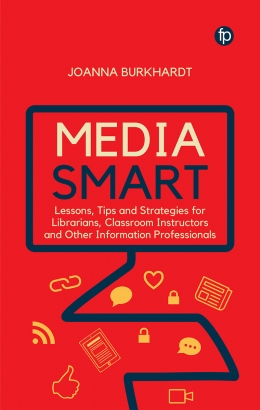
Primary tabs
You don't need to be an ALA Member to purchase from the ALA Store, but you'll be asked to create an online account/profile during the checkout to proceed. This Web Account is for both Members and non-Members.
If you are Tax-Exempt, please verify that your account is currently set up as exempt before placing your order, as our new fulfillment center will need current documentation. Learn how to verify here.
- Description
- Table of Contents
- About the author
Information has become one of the most crucial commodities in today's world. From multinational corporations to single individuals, we all make critical decisions based on the information available to us. However, modern ease of access to information does not often guarantee access to good information. In this digital age, where facts can be easily manipulated to align with political, social or monetary aims, media literacy has become an essential skill.
Media Smart: Lessons, Tips and Strategies for Librarians, Classroom Instructors and Other Information Professionals is an invaluable toolkit for navigating the fraught information landscape. From the history of media manipulation to practical applications of media literacy, this book will offer a thorough grounding in teaching students to defend themselves from mis-and dis-information. It discusses how technology affects the information we receive, offers a brief look at the psychology behind how we process information, describes the various means by which media can be manipulated and provides tips about how to recognize and avoid false or misleading information. Featuring numerous classroom exercises and case studies specific to each aspect of media manipulation, this book is essential reading for students and educators in communications, media and information literacy as well as librarians and anyone interested in developing their media literacy skills.
Chapter 1 A brief history of media and media manipulation
Chapter 2 Psychology of memory and learning
Chapter 3 The Internet, technology and the media
Chapter 4 Selecting information sources
Chapter 5 Expertise, authority and Credibility
Chapter 6 Language in media messages
Chapter 7 Algorithms, Bots, Cyborgs and Artificial Intelligence
Chapter 8 Statistics and data visualizations
Chapter 9 Images, Reverse Image Searching and Deepfakes
Chapter 10 Media manipulation and Fact Checking
Chapter 11 The ethics of likes, clicks, shares and data harvesting
Chapter 12 How we can help ourselves
Joanna M. Burkhardt
Joanna M. Burkhardt is Full Professor/Librarian at the University of Rhode Island Libraries. She is Director of the branch libraries in Providence and Narragansett and the URI Libraries Collection Development Manager. She earned an MA in anthropology from the University of Wisconsin–Madison and an MLS from the University of Rhode Island. She has taught information literacy to both students and teachers since 1999. She has given workshops, presentations, podcasts, keynote addresses, and panel discussions about information literacy. She is coauthor or author of four books about information literacy. She addressed the topic of fake news at the ALA Annual Conference in 2017 and designed a poster and bookmark on that topic for ALA Graphics.


